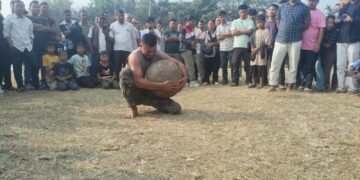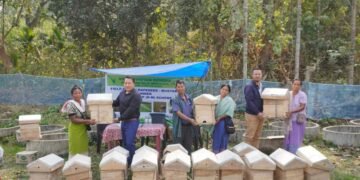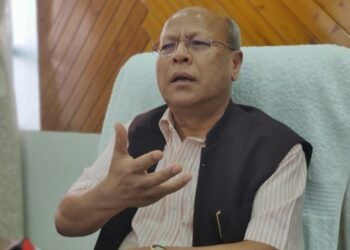By Dipak Kurmi
World Health Day is a pivotal global health awareness initiative celebrated annually on April 7 under the sponsorship of the World Health Organization (WHO). It commemorates the founding of WHO in 1948 and serves as a platform to highlight pressing health challenges while mobilizing action worldwide. Since its inception in 1950, each year’s observance focuses on a specific theme of significant relevance to global health. In 2025, the chosen theme, “Healthy Beginnings, Hopeful Futures,” underscores the critical importance of maternal and newborn health, advocating for accessible, high-quality healthcare services to reduce preventable maternal and neonatal deaths.
The Urgency of Maternal and Newborn Health
Maternal and newborn health remains one of the most crucial public health concerns worldwide. Despite medical advancements, an alarming number of mothers and infants continue to face life-threatening complications. According to WHO, approximately 300,000 women die each year due to pregnancy-related complications, and over 2 million newborns succumb within their first month of life. Additionally, 2 million stillbirths occur annually, many of which could be prevented with timely medical intervention. Shockingly, these figures translate to a preventable maternal or newborn death every seven seconds.
While remarkable progress has been made in reducing maternal mortality rates, the global community is still far from meeting its targets. Currently, 4 out of 5 countries are not on track to achieve the 2030 Sustainable Development Goals (SDGs) for reducing maternal deaths, and 1 in 3 countries will likely fail to lower neonatal mortality rates. The disparity is most evident in low- and middle-income nations, where access to essential healthcare services is severely limited.
Maternal and Newborn Health in India: Progress and Challenges
India has made notable strides in improving maternal and infant health over the past decade. The country’s Maternal Mortality Ratio (MMR) has declined from 130 per 100,000 live births in 2014–15 to 97 in 2018–2020, reflecting significant progress. However, India still accounts for over 17% of global maternal and neonatal deaths and stillbirths, a concerning figure that underscores the urgency for continued intervention.
Neonatal mortality rates remain high, with many deaths resulting from preventable conditions such as infections, birth asphyxia, and complications during labor. Healthcare access in rural and marginalized communities poses a persistent challenge, with many regions suffering from inadequate infrastructure, a shortage of skilled medical professionals, and limited emergency services. Socioeconomic inequalities further impact maternal healthcare accessibility, with many women unable to seek essential services due to financial constraints, lack of awareness, and social barriers.
A major concern is the lack of proper postnatal care, particularly for small and sick newborns. The first 24 hours after delivery are the most critical, accounting for 40% of neonatal deaths and nearly half of all maternal deaths. Despite improvements, only a few regions, such as Latin America and the Caribbean, have achieved WHO’s projected 80% postpartum care coverage.
Government Initiatives: Strengthening Maternal and Neonatal Health
To address these challenges, India has implemented several targeted government programs aimed at improving maternal and newborn healthcare services. The National Health Mission (NHM) has adopted a holistic Reproductive, Maternal, Infant, Child, and Adolescent Health (RMNCH+A) strategy that ensures comprehensive healthcare at every stage of life. Some key initiatives include:
- Pradhan Mantri Surakshit Matritva Abhiyan (PMSMA): Ensuring free antenatal check-ups for pregnant women on the 9th of every month, promoting quality medical care.
- Janani Suraksha Yojana (JSY): Providing financial support to low-income pregnant women to encourage institutional deliveries and enhance emergency maternal care services.
- Ayushman Bharat: A comprehensive healthcare scheme aimed at reducing out-of-pocket medical expenses and increasing access to quality healthcare, particularly for economically disadvantaged populations.
Accredited Social Health Activists (ASHAs) and other healthcare workers play a pivotal role in raising awareness, educating communities, and connecting families to life-saving healthcare services. However, to bridge existing gaps, additional investments in healthcare infrastructure, medical training, and emergency response systems are imperative.
Key Strategies to Enhance Maternal and Newborn Health
The “Healthy Beginnings, Hopeful Futures” campaign advocates for a multi-pronged approach to maternal and newborn health. Beyond merely ensuring access to medical facilities, it emphasizes preventive healthcare, early intervention, and long-term sustainable solutions. Several key strategies include:
- Enhancing Healthcare Infrastructure
o Strengthening Primary Healthcare Centers (PHCs) to deliver comprehensive maternity and newborn care services.
o Expanding and upgrading Special Newborn Care Units (SNCUs) and Neonatal Intensive Care Units (NICUs) with well-trained personnel.
o Ensuring the availability of essential medicines and emergency obstetric care facilities in remote areas.
- Promoting Maternal Health Education & Awareness
o Conducting public health campaigns to educate women about prenatal care, nutrition, and the importance of institutional deliveries.
o Encouraging community participation through workshops and support groups.
o Utilizing mass media and digital platforms to disseminate critical health information.
- Leveraging Technology & Innovation
o Implementing telemedicine and mobile health units to bridge the healthcare accessibility gap.
o Encouraging the use of mobile health apps that provide maternal care guidance, vaccination reminders, and access to medical assistance.
o Adopting digital health records, such as ABHA (Ayushman Bharat Health Account) apps, to track health indicators and facilitate timely interventions.
- Strengthening Policy & Advocacy Efforts
o Enforcing supportive policies that prioritize maternity leave, workplace safety, and breastfeeding rights.
o Enhancing inter-governmental collaborations with NGOs and international partners to address systemic healthcare challenges.
o Addressing social determinants of health, including poverty, education, and gender equality, to reduce healthcare disparities.
o
A Global Call to Action
World Health Day 2025 is not merely a symbolic observance; it is a global call to action. The WHO urges governments, healthcare organizations, and individuals to collectively prioritize maternal and newborn health in national healthcare agendas. Efforts must focus on:
- Investing in maternal and neonatal healthcare services, especially in underserved regions.
- Educating communities on the importance of maternal health, reducing cultural barriers to medical care.
- Fostering public-private partnerships to improve healthcare delivery and sustainability.
The well-being of mothers and newborns is not just a health priority; it is a societal imperative. A healthy beginning sets the stage for a hopeful, thriving future—for individuals, families, and the nation as a whole. By working together and committing to sustainable healthcare solutions, the world can ensure that every mother and every newborn receives the care, dignity, and support they deserve.
(The writer can be reached at dipakkurmiglpltd@gmail.com)

























